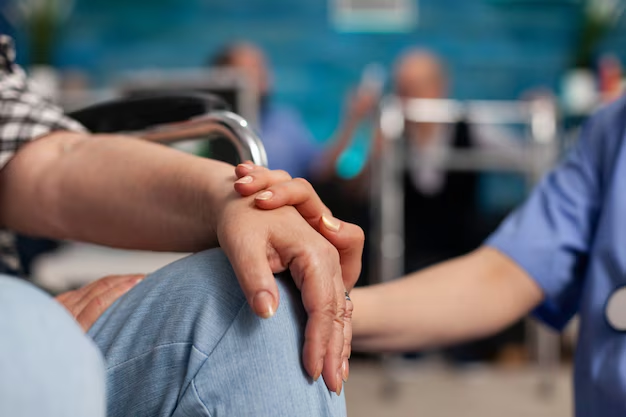Your Guide to What Does Parkinson's Feel Like
What You Get:
Free Guide
Free, helpful information about Parkinsons FAQ and related What Does Parkinson's Feel Like topics.
Helpful Information
Get clear and easy-to-understand details about What Does Parkinson's Feel Like topics and resources.
Personalized Offers
Answer a few optional questions to receive offers or information related to Parkinsons FAQ. The survey is optional and not required to access your free guide.
Understanding the Experience of Living with Parkinson's Disease
Imagine a life where each morning is greeted with a silent battle within your body. Movements that used to be second nature now require deliberate effort and focus. This is a glimpse into the world of those living with Parkinson's disease—a chronic and progressive disorder of the nervous system. Symptoms often start slowly, with a barely noticeable tremor in just one hand. But over time, the disease affects a person’s entire body and life, manifesting in ways both visible and invisible.
The Journey of Symptoms
One of the hallmarks of Parkinson's is its progressive nature. In the early stages, you might experience mild symptoms such as:
- Tremors: Often beginning in one hand, characterized by rhythmic shaking.
- Slowness of movement (bradykinesia): Everyday tasks become time-consuming—buttoning a shirt might feel like a Herculean effort.
- Stiff muscles: This can limit range of motion and result in pain.
- Impaired posture and balance: A propensity to stoop or fall over.
As the disease progresses, people with Parkinson’s might also experience more pervasive symptoms:
- Speech changes: Speaking softly or quickly, slurring words, or hesitating before speaking.
- Writing changes: Handwriting becomes smaller and more difficult to read.
- Non-motor symptoms: Including sleep disturbances, depression, and constipation.
The Emotional and Financial Impact
Living with Parkinson's isn't just about dealing with physical symptoms. There's an emotional toll, as well. It can be frustrating to struggle with movements that others take for granted. Anxiety and depression are common companions for those with Parkinson’s.
Financial stress often accompanies the diagnosis, too. The costs of treatment, medication, and therapies can be burdensome. Fortunately, there are resources and programs to ease this burden:
Government Aid Programs and Financial Assistance
- Medicare and Medicaid: Both can offer vital support in covering healthcare costs for those with disabilities.
- Social Security Disability Insurance (SSDI): Provides financial assistance to individuals unable to work due to their medical condition.
- Supplemental Security Income (SSI): This offers additional income support for those with limited income.
Additionally, managing finances with managing health can be challenging if you're dealing with rising medical debt. Debt relief options and credit counseling can provide support:
- Debt relief services: Many nonprofits assist individuals in negotiating and reducing medical and other debts.
- Credit card solutions: Some creditors offer hardship programs specifically designed for those with chronic illnesses.
Lastly, education and awareness can be an empowering tool for those with Parkinson’s. Access to educational programs and community support groups can help patients better navigate their journey.
A Path to Support and Education
It's vital to know that you're not alone in facing these challenges. By reaching out to available programs and resources, those affected by Parkinson’s can alleviate some of the financial stresses and focus more on their health and well-being.
Here’s a quick reference guide to some useful resources:
- 💸 Medicare/Medicaid: For medical expenses and treatment coverage.
- 🏦 SSDI & SSI: Financial support for those unable to work.
- 🏢 Debt Relief Services: Assistance for managing medical debt.
- 💳 Credit Card Hardship Programs: Financial solutions tailored to ease the burden.
- 📚 Educational Grants: Access to learning and support communities.
Taking advantage of these resources can make a big difference in the quality of life for those living with Parkinson's, ensuring a focus on what truly matters: living each day with dignity and hope.
What You Get:
Free Parkinsons FAQ Guide
Free, helpful information about What Does Parkinson's Feel Like and related resources.

Helpful Information
Get clear, easy-to-understand details about What Does Parkinson's Feel Like topics.

Optional Personalized Offers
Answer a few optional questions to see offers or information related to Parkinsons FAQ. Participation is not required to get your free guide.


Discover More
- Are There Environmental Causes Of Parkinsons
- Can Alcohol Cause Parkinson's
- Can Concussions Cause Parkinson's
- Can Concussions Cause Parkinson's Disease
- Can Dogs Get Parkinson's Disease
- Can Dogs Get Parkinsons
- Can Dogs Have Parkinson's
- Can Dogs Have Parkinson's Disease
- Can Females Get Parkinson Disease
- Can Head Trauma Cause Parkinson's
